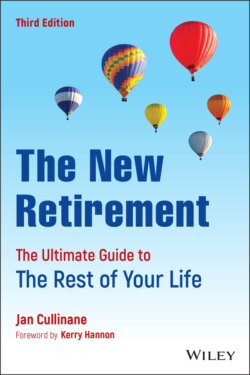Читать книгу The New Retirement - Jan Cullinane - Страница 22
Secret 3: Have Strong Social Support
ОглавлениеThis “secret” is a biggie. Bette Midler is famous for it and Donkey sang it in the movie Shrek: “But ya got to have friends.” There is an abundance of research linking social connections to longer lifespans. And, strong connections result in more than just additional years – they are healthier and happier years as well, which is why I prefer the term “healthspan” to “lifespan.” An ad for a 1946 book about aging got it right: “The important thing to you is not how many years in your life, but how much life in your years!”
A few specifics:
Harvard Health Publishing/Harvard Medical School (2019) summarized research showing that positive family, friends, and religious and community connections are as beneficial to your health as sufficient shut-eye, a healthy diet, and being a nonsmoker. Their newsletter also cited a study involving more than 300,000 people that found that a “lack of strong relationships increased the risk of premature death from all causes by 50% – an effect on mortality risk roughly comparable to smoking up to 15 cigarettes a day, and greater than obesity and physical inactivity.”
Lynn Giles, PhD, and three other researchers followed 1,500 people for 10 years and found that those with extensive social networks outlived those lacking social support by 22%. Interestingly, their research showed friends had a more powerful effect on longevity than family.
A 13-year study showed that men and women 65 years and older who were more socially active lived an average of 2.5 years longer. This study was notable because the activities included things such as playing cards, eating out, or going to movies with others. It demonstrated that social engagement alone can increase lifespan.
An interesting 2019 study, titled “Friendships That Money Can Buy,” reported by the National Center for Biotechnology Information, looked at the connection between money and social support. The authors of the study found that “greater financial security predicted greater social connectedness, which in turn supported better health.” Their conclusion? Financial security “increases opportunities for social connection.” Makes sense. If you have the financial wherewithal to join a gym or tennis center, travel, eat out socially, spend time volunteering, go to the theater, and so forth, you increase your opportunities for social interactions and creating friendships. (More on achieving financial security in Chapters 7, 8, and 9.)
We've heard the expression “friends with benefits.” Well, friends are the benefit! We all want – and need – to have someone to “play with” in retirement. It's worth noting that many of us worry about making new friends. We tend to have a lower opinion of ourselves and think we are more boring than others think we are. It's called the “liking gap,” and a study in 2018, pairing strangers together for conversations, found that people were better liked and made better impressions than they thought they did. It's very helpful to know we're more likable than we think we are!
